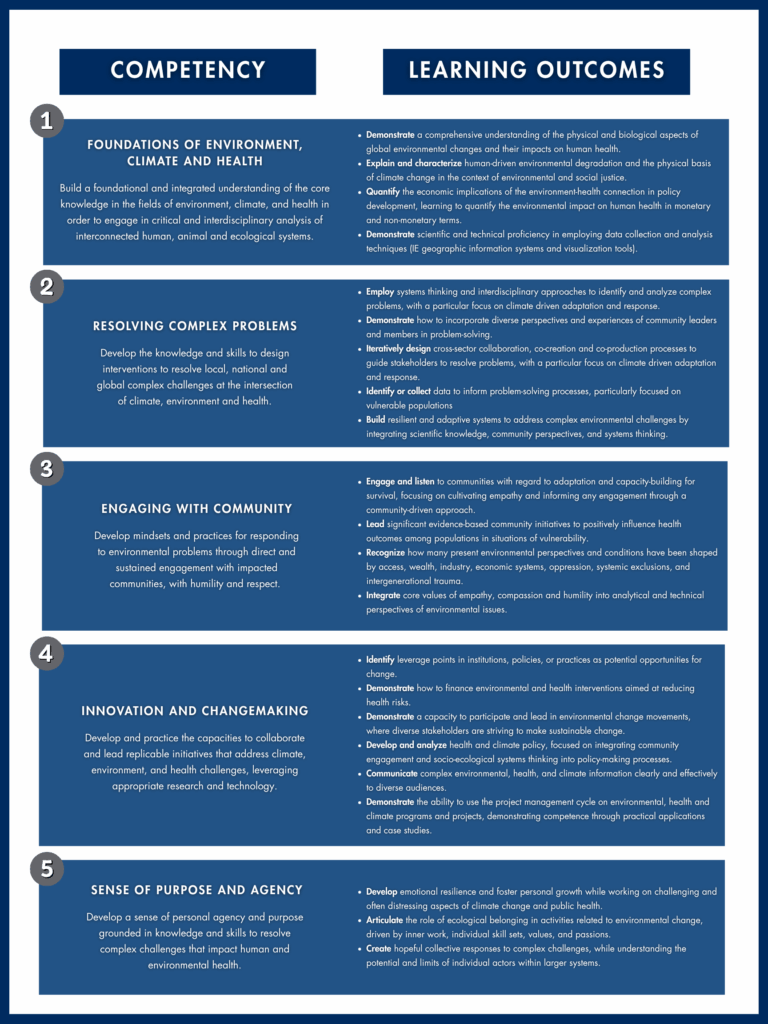Core Competencies
The Master of Science in Climate, Environment & Health is built around five core competencies that guide student learning throughout the program. Each competency is supported by specific learning outcomes that reflect a combination of knowledge, skills, and values. Rather than a checklist, these competencies represent an ongoing process of learning, application, and reflection—designed to prepare students for real-world impact at the intersection of climate, environment, and health.
ENVIRONMENT, CLIMATE & HEALTH FOUNDATIONS
RESOLVING COMPLEX PROBLEMS
ENGAGING WITH COMMUNITY

The Master of Science in Climate, Environment & Health has five program-wide core competencies that students are expected to master over the course of the degree. Each competency is broken down into learning outcomes, which in turn involve mastery of knowledge, skills, and values in order to achieve a competency. Although presented as a list, the competencies involve iterative processes of learning, doing and reflecting in order to demonstrate mastery.
1. FOUNDATIONS OF ENVIRONMENT, CLIMATE AND HEALTH
Build a foundational and integrated understanding of the core knowledge in the fields of environment, climate, and health in order to engage in critical and interdisciplinary analysis of interconnected human, animal and ecological systems.
- Demonstrate a comprehensive understanding of the physical and biological aspects of global environmental changes and their impacts on human health.
- Explain and characterize human-driven environmental degradation and the physical basis of climate change in the context of environmental and social justice.
- Quantify the economic implications of the environment-health connection in policy development, learning to quantify the environmental impact on human health in monetary and non-monetary terms.
- Demonstrate scientific and technical proficiency in employing data collection and analysis techniques (i.e. geographic information systems and visualization tools).
2. RESOLVING COMPLEX PROBLEMS
Develop the knowledge and skills to design interventions to resolve local, national and global complex challenges at the intersection of climate, environment and health.
- Employ systems thinking and interdisciplinary approaches to identify and analyze complex problems, with a particular focus on climate-driven adaptation and response.
- Demonstrate how to incorporate diverse perspectives and experiences of community leaders and members in problem-solving.
- Iteratively design cross-sector collaboration, co-creation and co-production processes to guide stakeholders to resolve problems, with a particular focus on climate-driven adaptation and response.
- Identify or collect data to inform problem-solving processes, particularly focused on vulnerable populations.
- Build resilient and adaptive systems to address complex environmental challenges by integrating scientific knowledge, community perspectives, and systems thinking.
3. ENGAGING WITH COMMUNITY
Develop mindsets and practices for responding to environmental problems through direct and sustained engagement with impacted communities, with humility and respect.
- Engage and listen to communities with regard to adaptation and capacity-building for survival, focusing on cultivating empathy and informing any engagement through a respectful, equitable lens.
- Lead significant evidence-based community initiatives to positively influence health outcomes among populations in situations of vulnerability.
- Recognize how many present environmental perspectives and conditions have been shaped by access, wealth, industry, economic systems, oppression, systemic exclusions, and intergenerational trauma.
- Integrate core values of empathy, compassion and humility into analytical and technical perspectives of environmental issues.
4. INNOVATION AND CHANGEMAKING
Develop and practice the capacities to collaborate and lead replicable initiatives that address climate, environment, and health challenges, leveraging appropriate research and technology.
- Identify leverage points in institutions, policies, or practices as potential opportunities for change.
- Demonstrate how to finance environmental and health interventions aimed at reducing health risks.
- Demonstrate a capacity to participate and lead in environmental change movements, where diverse stakeholders are striving to make sustainable change.
- Develop and analyze health and climate policy, focused on integrating community engagement and socioecological systems thinking into policy-making processes.
- Communicate complex environmental, health, and climate information clearly and effectively to diverse audiences.
- Demonstrate the ability to use the project management cycle on environmental, health and climate programs and projects, demonstrating competence through practical applications and case studies.
5. SENSE OF PURPOSE AND AGENCY
Develop a sense of personal agency and purpose grounded in knowledge and skills to resolve complex challenges that impact human and environmental health.
- Develop emotional resilience and foster personal growth while working on challenging and often distressing aspects of climate change and public health.
- Articulate the role of ecological belonging in activities related to environmental change, driven by inner work, individual skill sets, values, and passions.
- Create hopeful collective responses to complex challenges, while understanding the potential and limits of individual actions within larger systems.
